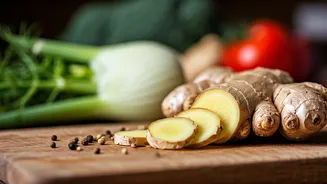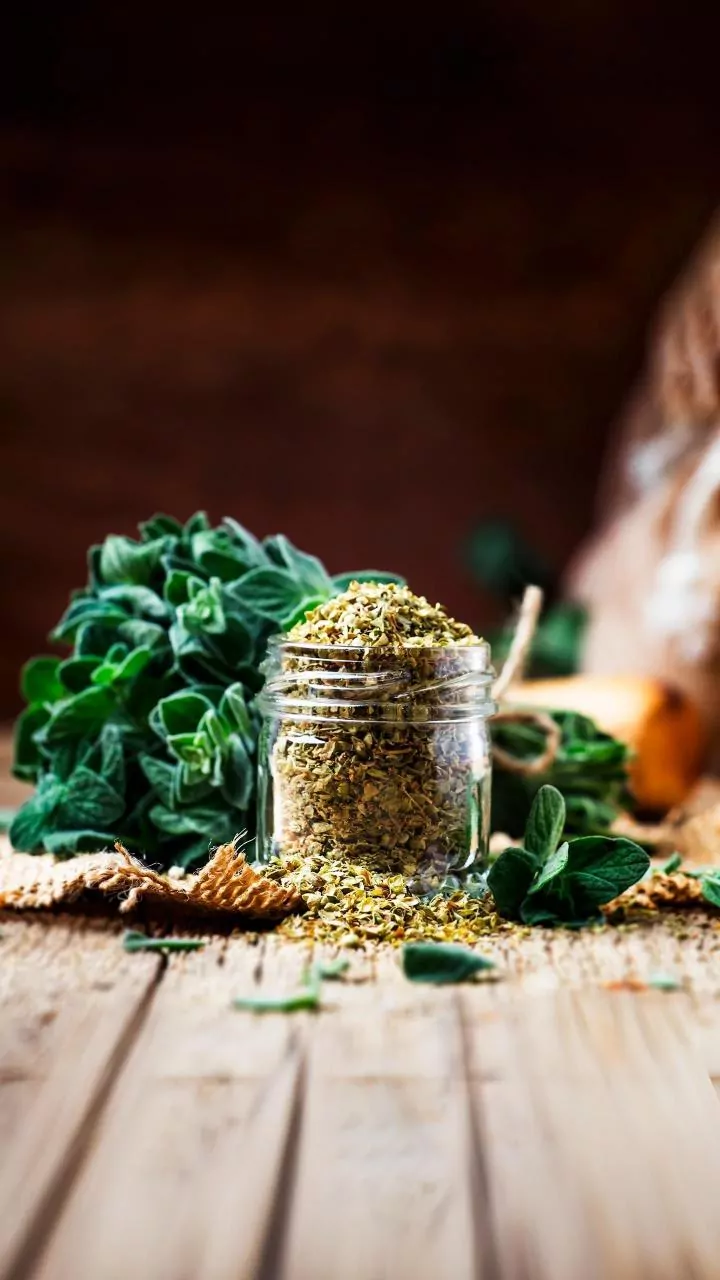Peppermint Power
Peppermint has long been recognized for its ability to soothe digestive troubles. Its active compound, menthol, helps relax the muscles of the digestive tract,
aiding in the smooth passage of gas. Peppermint tea or peppermint oil capsules are popular ways to harness these benefits. Studies have shown that peppermint oil can reduce irritable bowel syndrome (IBS) symptoms, which often include bloating and gas. A cup of peppermint tea after meals may help improve digestion. The refreshing qualities of peppermint also act as a bonus, offering a pleasant way to alleviate discomfort.
Ginger's Digestive Aid
Ginger is another powerful natural remedy for gas and bloating. It contains compounds that speed up digestion and ease inflammation in the gut. Ginger helps by promoting the movement of food through the digestive system, reducing the time food sits and ferments, which can produce gas. It also acts as an anti-inflammatory, helping to calm the gut and reduce associated discomfort. Ginger can be consumed in various forms, including fresh ginger in meals, ginger tea, or even ginger supplements. Its warm, spicy flavor makes it a versatile ingredient, and its health benefits are well-documented.
Fennel's Gentle Touch
Fennel seeds, and fennel in various forms, have been traditionally used to relieve bloating and gas. They contain compounds that can relax the muscles of the intestines, reducing spasms and facilitating the release of trapped gas. Fennel also has diuretic properties, which can help reduce water retention that sometimes contributes to bloating. Fennel seeds can be chewed directly after meals, brewed into tea, or added to various dishes for a subtle, licorice-like flavor. Incorporating fennel into your diet can provide a gentle yet effective way to improve your digestive health and minimize bloating.
Turmeric's Anti-Inflammation
Turmeric, with its active ingredient curcumin, is renowned for its anti-inflammatory properties. Inflammation in the gut can contribute significantly to bloating and gas. Curcumin helps reduce this inflammation, creating a more favorable environment for digestion. Turmeric also stimulates the production of bile, which aids in the breakdown of fats, further enhancing digestion. It can be added to various dishes or consumed as a supplement. Using turmeric is a flavorful way to support your gut health and alleviate bloating and gas naturally.
Chamomile's Soothing Effect
Chamomile tea is well-known for its calming and soothing properties, which extend to the digestive system. It can help relax the muscles of the digestive tract, reducing spasms that lead to gas and bloating. Chamomile also has anti-inflammatory properties that can soothe an irritated gut. The relaxing effects of chamomile can also reduce stress, which sometimes contributes to digestive issues. A warm cup of chamomile tea is a gentle and delicious way to ease discomfort and promote healthy digestion.
Cinnamon's Digestive Boost
Cinnamon is not just a tasty spice; it also offers significant digestive benefits. It can help improve digestion by reducing bloating and gas, and its anti-inflammatory properties contribute to a healthier gut environment. Cinnamon is known to stimulate the digestive system, which aids in the efficient processing of food. Its warm flavor adds complexity to many dishes, from sweet to savory. The addition of cinnamon to your diet is a flavorful and effective way to promote digestive health and alleviate uncomfortable symptoms.
Papaya's Enzyme Action
Papaya contains the enzyme papain, which is a powerful aid to digestion, breaking down proteins to make them easier to digest. This action reduces the likelihood of food lingering in the gut and fermenting, which reduces gas and bloating. Papaya can also help soothe the stomach lining, adding to its benefits. The sweet, tropical flavor of papaya makes it a delightful addition to your daily meals or as a snack. Consuming papaya is a delicious and effective method for supporting gut health and reducing digestive discomfort.
Pineapple's Bromelain Benefit
Pineapple, like papaya, contains an enzyme that aids in digestion. Bromelain, found in pineapple, has anti-inflammatory properties and helps break down proteins. Bromelain can also ease digestive discomfort. Eating fresh pineapple or drinking pineapple juice can help minimize bloating and gas. Its sweet, tangy flavor makes pineapple a refreshing option for those seeking digestive relief.
Yogurt's Probiotic Support
Yogurt, especially those containing live and active cultures (probiotics), supports gut health by introducing beneficial bacteria. These probiotics assist with digestion and help balance the gut flora, reducing the chances of gas and bloating. Probiotics promote a healthy balance within the digestive tract, reducing discomfort. Choose yogurts with specific probiotic strains, such as Lactobacillus or Bifidobacterium, to maximize these benefits. Including yogurt in your diet is a simple and effective way to improve digestive health and alleviate bloating naturally.
Kiwi's Fiber Content
Kiwi is a source of fiber, which helps regulate bowel movements and improve digestion. Fiber promotes the movement of food through the digestive tract, preventing constipation and reducing gas buildup. Kiwis also contain enzymes that aid in protein digestion. This combined action minimizes bloating and supports digestive function. The tangy flavor of kiwis makes them a refreshing addition to breakfast, snacks, or desserts. Eating kiwis is a natural and straightforward way to promote regular digestion and relieve bloating.

















